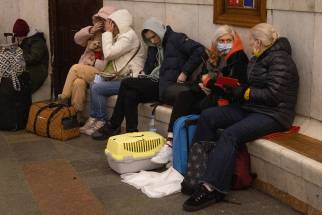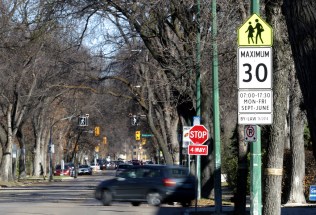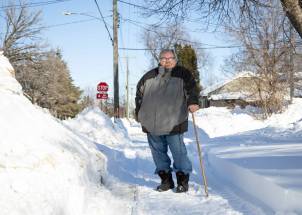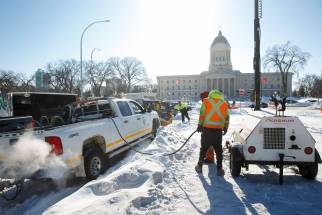Vaccination, testing mandate for Manitoba health-care, public-sector workers ends next week
Read this article for free:
or
Already have an account? Log in here »
To continue reading, please subscribe:
Monthly Digital Subscription
$0 for the first 4 weeks*
- Enjoy unlimited reading on winnipegfreepress.com
- Read the E-Edition, our digital replica newspaper
- Access News Break, our award-winning app
- Play interactive puzzles
*No charge for 4 weeks then price increases to the regular rate of $19.00 plus GST every four weeks. Offer available to new and qualified returning subscribers only. Cancel any time.
Monthly Digital Subscription
$4.75/week*
- Enjoy unlimited reading on winnipegfreepress.com
- Read the E-Edition, our digital replica newspaper
- Access News Break, our award-winning app
- Play interactive puzzles
*Billed as $19 plus GST every four weeks. Cancel any time.
To continue reading, please subscribe:
Add Free Press access to your Brandon Sun subscription for only an additional
$1 for the first 4 weeks*
*Your next subscription payment will increase by $1.00 and you will be charged $16.99 plus GST for four weeks. After four weeks, your payment will increase to $23.99 plus GST every four weeks.
Read unlimited articles for free today:
or
Already have an account? Log in here »
Hey there, time traveller!
This article was published 24/02/2022 (1384 days ago), so information in it may no longer be current.
The province’s plan to scrap the rule requiring vaccination or regular COVID-19 testing for direct care workers puts vulnerable Manitobans and the health-care system at risk, critics say.
On Thursday, Health Minister Audrey Gordon announced, in addition to dropping provincial vaccination requirements March 1, direct care health-care workers across the province and designated public-sector employees (including teachers and child care workers) won’t have to be vaccinated or submit to regular COVID-19 testing.
“We continue to see positive trends throughout the province,” Gordon said, noting hospitalizations and ICU admissions are on a downward trajectory.
“Now is the time to prepare for a return to normal,” the health minister said at a news conference with chief provincial public health officer Dr. Brent Roussin and David Matear, incident commander for Manitoba’s COVID-19 response.
“Together, we can look forward to a co-ordinated and cautious plan to recover from the intense demands that COVID-19 has placed on our health-care system.”
Gordon said a memo from the COVID-19 incident command, the heads of all health regions and service delivery organizations was being sent Thursday to employees advising them the requirement to be fully vaxxed or tested was being lifted, as of March 1.
“I was furious when I saw that,” said critical care physician Dr. Doug Eyolfson. “There’s no reason to be doing this.
“We have vulnerable populations in our health-care system — young children, who are too young to be vaccinated, people with chronic medical conditions, the elderly, people who are immuno-compromised, people on chemotherapy. These people are still at tremendous risk if exposed to COVID and the province has basically just said, essentially, ‘You’re on your own.’”
Social epidemiologist Souradet Shaw questioned the decision and its timing.
“I would think that those in health-care settings would be the exact population we’d consider vulnerable, and to the extent possible, provide the most protection to,” said Shaw, with the department of community health sciences at the University of Manitoba.
It might have been prudent to wait and see what the impacts of lifting vaccination and mask requirements would be before lifting protections for vulnerable people, he said.
Shaw also noted Manitoba’s uptake of third (booster) doses of the vaccine is less than optimal and there are “blind spots” in the province’s COVID-19 surveillance.
“So even if there is an argument to be made for lifting these protections, I think the timing of it is another issue altogether.”
“I was furious when I saw that. There’s no reason to be doing this.”
– critical care physician Dr. Doug Eyolfson
Roussin said officials have the “confidence to continue on our plan to loosen restrictions” because of projections that show declining hospitalizations and intensive-care admissions into next month.
Provincial proof-of-vaccination requirements end March 1, and mask use in indoor public spaces will no longer be mandatory, as of March 15.
Roussin presented updated modelling Thursday showing key COVID-19 indicators are on a downward trajectory after having peaked in January.
Manitoba vaccine cards, app to remain active
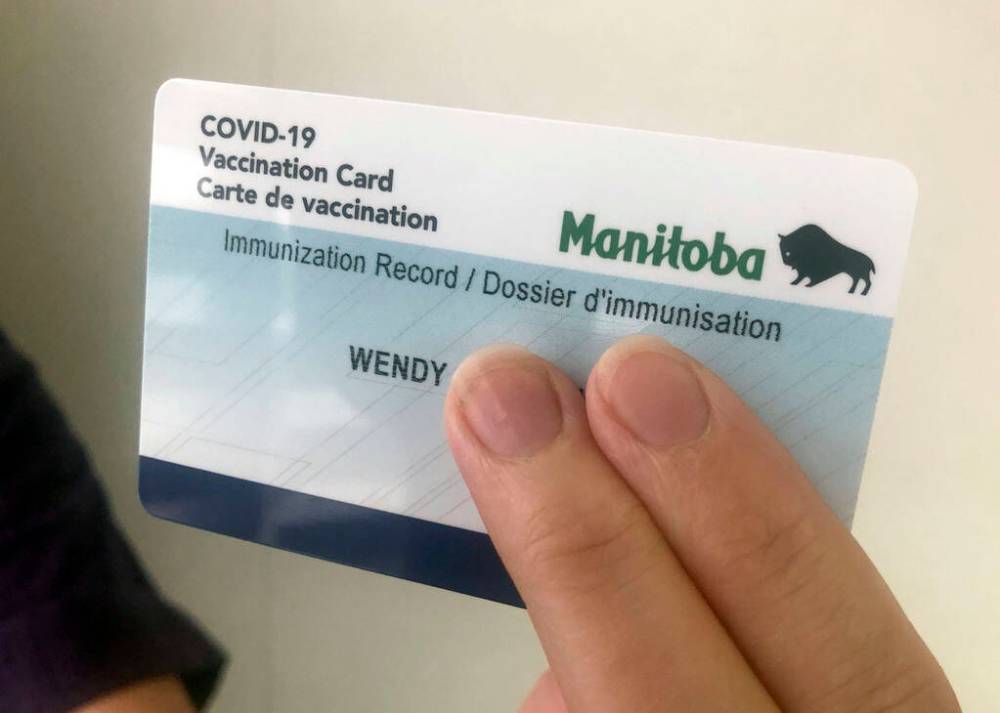
Posted:
Manitoba’s COVID-19 proof-of-vaccine cards and corresponding scanner app will remain active — even after the province lifts public health requirements March 1.
He acknowledged there are “different perspectives” on the public health restrictions that have been in place for a long time and transitioning out them “will be a difficult time for many.”
“We know this is going to be a difficult time, but as we see from that modelling, we are trending in that right direction and we’ll continue to watch those numbers very closely,” Roussin said.
So will Manitoba nurses, wary of another pandemic wave swamping the health-care system.
“We cannot be in a position where our ICUs and emergency departments and hospital beds are overflowing again,” Manitoba Nurses Union president Darlene Jackson said Thursday.
If a new COVID-19 variant drives up hospital admissions, the province can’t dither, she added. “This government really has to be proactive and act very quickly to put those restrictions back in place.”
Meantime, nurses who haven’t been working because of proof of vaccination or rapid-test requirement will be welcomed back March 1, she said. “We are in a critical nursing shortage so having as many nurses in the system as possible is something we’re advocating for all the time.”
However, the percentage of workers who chose unpaid leave rather than undergoing regular rapid tests or providing proof of vaccination is so small allowing them to return to work now with vulnerable people, when COVID-19 infection rates remain high, makes no sense, Eyolfson countered.
“It has not been a significant burden to staffing levels,” the doctor said. “So what earthly reason is there for doing this?”
As of Monday, 119 direct care workers were on unpaid leave as a result of the public health order to either be vaxxed or tested, and 1,500 who were working required regular rapid testing, Shared Health said.
Lifting those requirements for workers puts the most vulnerable Manitobans at risk, opposition members say.
“I think it’s a mistake,” said NDP health critic Uzoma Asagwara (Union Station), a former nurse. “It shows the lack of this government’s willingness to prioritize the folks in our communities who are most vulnerable to COVID-19.”
“If you’re going to get rid of restrictions, the last thing you should be doing is telling people they don’t need to be vaccinated,” said Liberal Leader Dougald Lamont.
“We still have half of Manitobans who don’t have a third shot,” he said referring to the 570,690 who’ve received a COVID-19 booster, versus 503,352 with two doses, and 58, 272 with just one.
The number of COVID-positive ICU patients in Manitoba has declined 40 per cent since Feb. 1, and fell 16 per cent in the past week, said Matear. The COVID-19 response incident commander said ICU capacity remains at 124 beds; before the pandemic, it was 72.
As pandemic pressures ease, the 500 provincial health-care employees who’ve been redeployed across the system will be returning to their pre-pandemic work “as soon as we’re operationally able,” Matear said.
“For the immediate future, the health system’s focus will be on both maintaining capacity and supporting recovery.”
As for Manitoba’s massive surgical and diagnostic procedure backlog, Gordon expects an update from the task force addressing it “very soon.”
carol.sanders@freepress.mb.ca
katie.may@freepress.mb.ca


Katie May is a general-assignment reporter for the Free Press.
Our newsroom depends on a growing audience of readers to power our journalism. If you are not a paid reader, please consider becoming a subscriber.
Our newsroom depends on its audience of readers to power our journalism. Thank you for your support.
History
Updated on Thursday, February 24, 2022 1:27 PM CST: Adds charts.
Updated on Thursday, February 24, 2022 2:55 PM CST: adds sidebar about vax app
Updated on Thursday, February 24, 2022 7:01 PM CST: Adds formatting
Updated on Friday, February 25, 2022 12:08 AM CST: Fixes typo.



